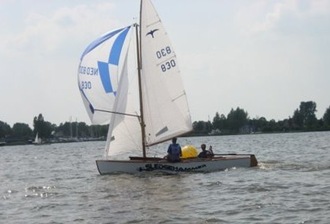This evening I'll have the opportunity to attend my first appeal committee meeting. As I posted before I was invited to attend this year as an observer.
Last month three appeals have been send in. Due to the confidentiality in this process I'm not allowed to tell you about the actual cases, just yet.
Appeals are the second layer provided in the rules, in case parties do not agree with the decision of the protest-committee. Only a party to the hearing can "appeal" that decision to the National Authority. In the Netherlands our MNA has formed "de Zeilraad" (translates as: Sailing Counsel) to handle those appeals.
Most PC's are done by more knowledgeable sailors or persons who have studied the rules, like me. But still we amateurs. And we do make mistakes or don't know everything. Therefore it's not something to feel ashamed of if your decision is appealed. Unless a PC has been very sloppy or made procedural mistakes, it should welcome the help of experts.
Appeal committees have a couple of options: (rule 71.2 RRS)
- They can uphold, change or reverse the decision of the PC
After collecting all the relevant papers and asking for comments on the appeal from all parties, they will give a decision. The facts found however are not open to appeal. This is because the appeal committee does not conduct a hearing finding those facts. That was the job of the PC and unless they are missing or inadequate, the appeal committee accepts the facts as found. On those facts they will draw a conclusion based on the rules and give a decision.
- They can declare the protest or request for redress invalid
If the appeals committee finds that validity has been compromised they will draw this conclusion.
- They can send the protest or request back for another hearing to the original or different protest-committee.
Typically this will be done when those facts are missing or inadequate. Sometimes because the procedure to get those facts were not adhered to. Like parties not present during the hearing or validity not established or witnesses not allowed. A new hearing is then conducted and the facts found, conclusion and decision are send to the appeals committee.
A picture of Valk 830 "Sledgehammer" sailed by Onno Yntema and Klaas Weissenbach jr. They won the National Championship 2008 yesterday!
In the past I have had a couple of appeals on protest were I was a member of the PC. With the first ones I felt a little anxious and nervous. Would the appeals committee agree with the decision? But lately that has not been the case. Those appeals were almost always about very tricky or seldom used rules, where I was glad more people looked at it and gave their verdict.
I didn't always agree with their interpretation, but that's not been a problem. The rules are complicated enough and we all have to accept that different insights will lead to different decisions.
How about you? Any appeals on your decisions?


I have an example.
ReplyDeleteThe decision of a Protest Committee which I sat on last summer was overturned on appeal.
A boat was protested for failing to sail the correct course.
The boat protested requested redress because it claimed that the SI were unclear.
Our PC found that:
* the boat protested had not sailed the correct course, but
* the sailing instructions were so confusing that their publication in that state was an improper action by the RC; and
* the boat protested sailed the incorrect course because of the confusing state of the SI.
Following rule 64.1(a) the PC disqualified the boat protested for breaking rule 28.1.
The PC then gave the boat protested redress (equal to average points).
On appeal, the Appeal Committee found that the protested boat's failure to study the SI carefully and understand the required courses contributed to the boat's score being made worse, thus that the 'through no fault of her own' requirement of rule 62.1 had not been met and redress should not have been given.
The redress given by the PC was removed, leaving the protested boat DSQ with no further need to adjust any other boat's scores.
This simple action as a result of the appeal was facilitated by the orignial PC's correct action in deciding on DSQ before granting redress, and using the normal course in rule A6.2 of not changing scores of other boats when redressis given.
On reflection, I agree with the Appeal Committee.
In our long discussion in the Protest Committee we agreed that if it took us, on the Protest Committee, more than half an hour in a warm, dry committee room to reach agreement on the correct meaning of the SI, then it was not reasonable or fair to expect a skipper and crew of a boat, in 25 to 30 kts of wind, on a starting line, to correctly do so.
I now agree with the Appeals Committee that we were wrong to find this way.
If it was possible, in any way, for the PC to interpret the correct meaning of the SI, then, it must have been possible for a skipper and crew to do so, if only they had tried hard enough or prepared for the race adequately.
So while the SI were poorly written, and this was an improper action by the RC, the boat protested contributed to her own downfall by not adequately preparing to race.
A good learning experience.
Brass